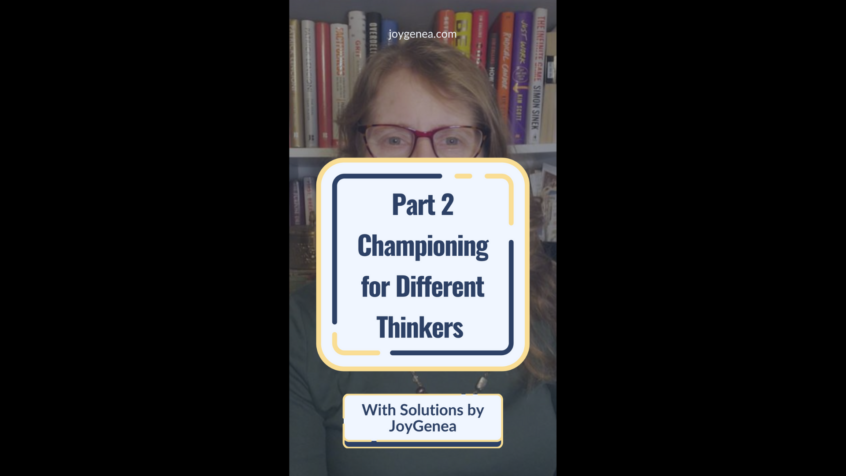Let’s talk about what championing for different thinkers looks like. My greatest lesson on this came from an 11-year-old who stood up for me back in school.
CLICK HERE for an in depth blog about Championing Different Thinkers.
CLICK HERE if you missed part 1 of the series.
CLICK HERE for part 3 of the series.
Transcription:
Hey, JoyGenea here. We are having a conversation about championing the different thinker, and what that might look like, and by championing I mean being an advocate for them. I mean standing up for someone.
So, a really great story I have about that, which I probably should’ve shared in the last video, but I’m just gonna share it now. Was, um I don’t know, I think I was probably 10 or 11 years old, I was in school, and someone was bullying me. They’d seen um my spelling paper and that I’d gotten an F and they were making fun of me. I remember I was standing in front of the coat wall and um this young boy was going at it pretty heavily verbally, “Oh you’re so stupid, and oh my God you can’t spell,” dadada, um and I was trying to defend myself. I was saying you know, “No I’m not, and yes I have a hard time spelling,” and anyways I was probably pretty close to tears, knowing me getting tired of fighting, and one of my fellow classmates actually was walking by, and he went, “Hey” he said to him, “Hey stupid, so what if she struggles with spelling, she always has, but did you know she’s a really good singer.” And the kid looked at me, that was bullying me and he goes, “You can sign?” And I’m like “Yeah, I’ve won, you know I’ve won little talent show things and stuff.” And he’s like, “Oh, well sing me a song.” And so, there in the moment I thought of a song he would like that I knew, and I sang him the song and he’s like, “You’re a really good singer.” And he never bullied me again. And I share that story because that’s about advocacy. That peer, my fellow student that stood up for me, he basically did a switch. He said, “Well so what? So what if she’s not a great speller? If none of us care, it’s not very powerful.” It took the power out of the whole thing, and then he said “But guess what, she’s really good at this.” What an amazing thing for an 11-year-old to do for somebody else, and I always use that as an example because as adults, why aren’t we doing that more? Right? I was taught best by an 11-year-old how to be a really good advocate for somebody else.
So, #2 on our items of the advocacy, is learning more about the different thinking that somebody’s presented. If they’ve told you that they have ADHD, ok what type of ADHD? Learn a little bit more about it. Feel comfortable to ask, do a little research online, become an explorer. If you are the boss of someone who’s disclosed that they have ADHD and they’re looking for some accommodations or some support on that, do some exploring, ask some more questions, figure out how to make this a win-win for everybody and figuring out what their strengths are, and then highlighting those and focusing things in that direction you’ll have incredible outcomes from that, but what I have noticed, if you want to hyper-focus on the deficits, I’ve had some clients come to me when their companies were in the middle of hyper-focusing on their deficits. You can do that. It’s not going to win you any great awards. It’s really gonna burn a variety of bridges on top of the fact, leave you open for some liability, and some other things so, it’s not your best recourse. I highly recommend #2 on my list which is learn some more about what I’m talking about.
Thanks, I’m JoyGenea, International Neurodiversity Coach for dyslexic and ADHD adults. Bye now.
